

Theory of Constraints. The theory of constraints (TOC) is a management paradigm that views any manageable system as being limited in achieving more of its goals by a very small number of constraints.
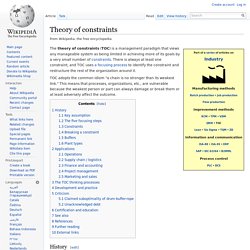
There is always at least one constraint, and TOC uses a focusing process to identify the constraint and restructure the rest of the organization around it. TOC adopts the common idiom "a chain is no stronger than its weakest link. " This means that processes, organizations, etc., are vulnerable because the weakest person or part can always damage or break them or at least adversely affect the outcome. History[edit] An earlier propagator of the concept was Wolfgang Mewes[2] in Germany with publications on power-oriented management theory (Machtorientierte Führungstheorie, 1963) and following with his Energo-Kybernetic System (EKS, 1971), later renamed Engpasskonzentrierte Strategie as a more advanced theory of bottlenecks.
Key assumption[edit] Social inertia. Social inertia is a term that applies the physics concept of inertia to other fields, in particular social science fields such as psychology and sociology.
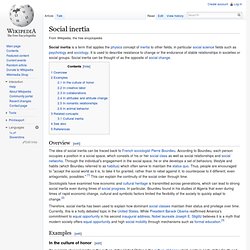
Appeal to tradition. Appeal to tradition (also known as argumentum ad antiquitatem,[1] appeal to antiquity, or appeal to common practice) is a common fallacy in which a thesis is deemed correct on the basis that it correlates with some past or present tradition.
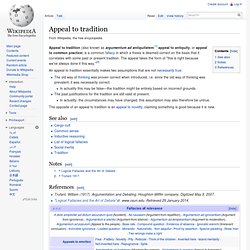
The appeal takes the form of "this is right because we've always done it this way. "[2] An appeal to tradition essentially makes two assumptions that are not necessarily true: The old way of thinking was proven correct when introduced, i.e. since the old way of thinking was prevalent, it was necessarily correct. Cargo cult. A cargo cult is a kind of Melanesian millenarian movement encompassing a diverse range of practices and occurring in the wake of contact with the commercial networks of colonizing societies.
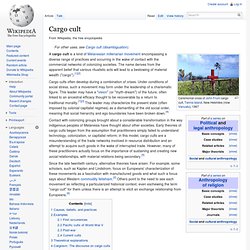
The name derives from the apparent belief that various ritualistic acts will lead to a bestowing of material wealth ("cargo").[1][2] Contact with colonizing groups brought about a considerable transformation in the way indigenous peoples of Melanesia have thought about other societies. Early theories of cargo cults began from the assumption that practitioners simply failed to understand technology, colonization, or capitalist reform; in this model, cargo cults are a misunderstanding of the trade networks involved in resource distribution and an attempt to acquire such goods in the wake of interrupted trade.
However, many of these practitioners actually focus on the importance of sustaining and creating new social relationships, with material relations being secondary.[5] Examples[edit] Post-war[edit] Inductive reasoning. Inductive reasoning (as opposed to deductive reasoning or abductive reasoning) is reasoning in which the premises seek to supply strong evidence for (not absolute proof of) the truth of the conclusion.
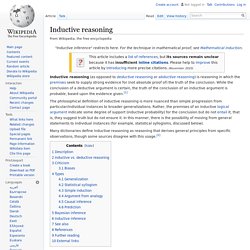
While the conclusion of a deductive argument is certain, the truth of the conclusion of an inductive argument is probable, based upon the evidence given.[1] The philosophical definition of inductive reasoning is more nuanced than simple progression from particular/individual instances to broader generalizations. Rather, the premises of an inductive logical argument indicate some degree of support (inductive probability) for the conclusion but do not entail it; that is, they suggest truth but do not ensure it. In this manner, there is the possibility of moving from general statements to individual instances (for example, statistical syllogisms, discussed below). Common sense. Common sense is a basic ability to perceive, understand, and judge things, which is shared by ("common to") nearly all people, and can be reasonably expected of nearly all people without any need for debate.[1] The everyday understanding of what common sense is derives from philosophical discussion, involving several European languages.
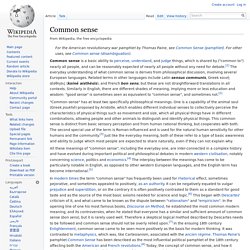
Related terms in other languages include Latin sensus communis, Greek κοινὴ αἲσθησις (koinē aísthēsis), and French bon sens, but these are not straightforward translations in all contexts. Similarly in English, there are different shades of meaning, implying more or less education and wisdom: "good sense" is sometimes seen as equivalent to "common sense", and sometimes not.[2] "Common sense" has at least two specifically philosophical meanings. Aristotle, who is the first person known to have discussed "common sense". Traditionalism.
Traditionalism may refer to: The systematic emphasis on the value of traditionTraditional values, those beliefs, moral codes, and mores that are passed down from generation to generation in religion and spirituality: in politics: Traditionalist conservatism, a political philosophy of the post–World War II United StatesCarlism, a Spanish political movement in the 19th and 20th centuryTraditionalism in sociologist Max Weber's writings, contrasted with capitalism other:
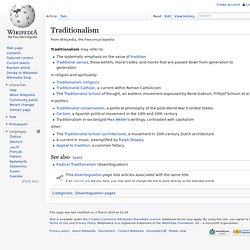
Current reality tree (TOC) The Current Reality Tree (CRT) is a powerful focusing procedure formulated by the late Eliyahu Goldratt, inventor of the Theory of Constraints.
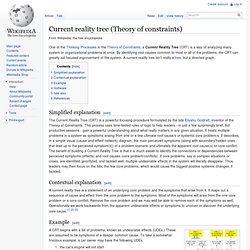
This process uses time-tested rules of logic to help leaders - in just a few surprisingly brief, but productive sessions - gain a powerful understanding about what really matters in any given situation. It treats multiple problems in a system as symptoms arising from one or a few ultimate root cause/s or systemic core problem/s. It describes, in a simple visual (cause-and-effect network) diagram, the main perceived symptoms (along with secondary/hidden ones that lead up to the perceived symptom(s)) of a problem scenario and ultimately the apparent root cause(s) or core conflict.
CurrentRealityTree Example.png - Wikipedia, the free encyclopedia.